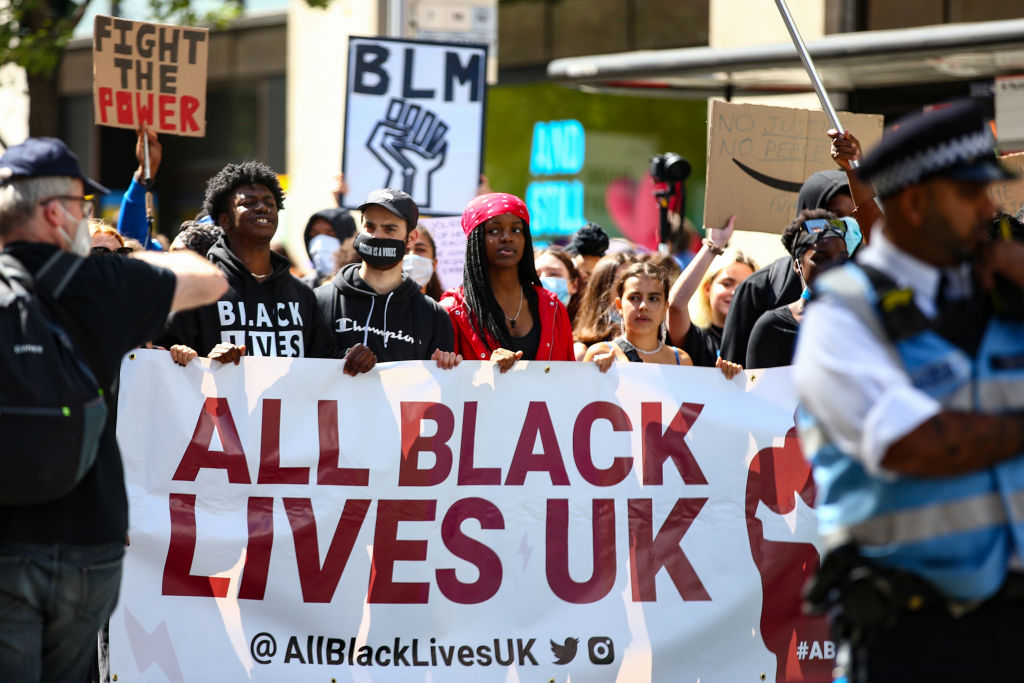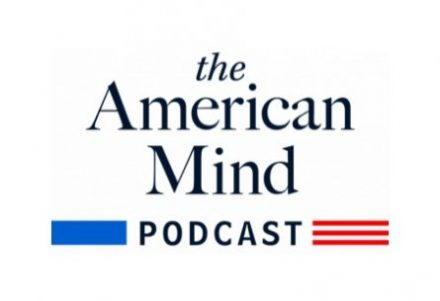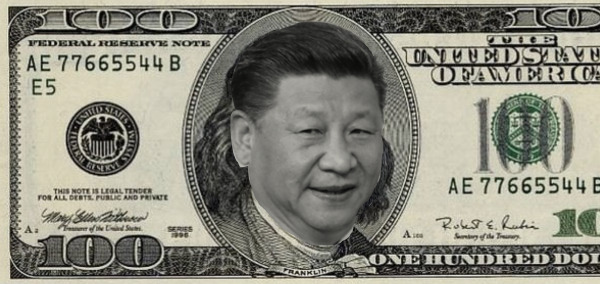America’s superior power is not a moral entitlement.
Woke Imperialism

America’s new cultural export is critical race theory.
The Central Intelligence Agency—a bureaucracy with a history of violently overthrowing democratically elected governments, training and supporting death squads across the world, indulging in “enhanced interrogation” (read: torture), and experimenting on unwitting prisoners with high doses of psychedelic drugs—is not an organization generally associated with “equity,” “diversity,” or “inclusion.”
But la révolution comes for all: in a recruitment video posted recently, a Latina CIA employee wearing a t-shirt depicting a pink raised fist inside a female gender symbol informed viewers that she was “a woman of color, a mom, a cisgender Millennial who has been diagnosed with generalized anxiety disorder.” As if to drive the point home further, she strolled past an office wall emblazoned with Native American proverbs and a lime-green block quote reading celebrate the spirit of inclusion. “I am intersectional…I refuse to internalize misguided patriarchal ideas of what a woman can or should be. I am tired of feeling like I am supposed to apologize for the space I occupy…I am unapologetically me.”
It is bizarre to witness an agency that waterboarded prisoners in black sites for the first decade of the 21st century waxing poetic about its commitment to social justice. But the video starkly demonstrates the extent to which the rolling revolution has successfully transformed the nation’s institutional power centers, transplanting traditional liberalism with the radicalism of critical race and gender theory—even in the places that one would least expect it.
The events of the past few months—from Marine memos on combating “abortion-related” or “anti-government” “extremism” and Navy training sessions proscribing any “ideology” that discriminates against “gender identity or sexual orientation” to the official organs of the Pentagon and the Department of Defense attacking Tucker Carlson for questioning the idea of pregnant women serving in the military—have revealed a defense establishment in the grips of a new, militant dogma.
As Wesley Yang has pointed out, this woke creed has ambitions to establish itself as the successor ideology to an old-fashioned classical liberalism that now looks weary, diffident, and insufficiently grounded in absolute moral conviction. USMC Reserve Major Aaron Reitz writes in Newsweek that the military’s “bureaucratic progressivism has hardened into iron-fisted wokeism,” replete with a burgeoning “diversity and inclusion” bureaucracy analogous to what Reitz describes as “a bloated military-industrial complex given over to Fortune 500-style corporate progressivism.”
How did this happen to the most powerful defense and national security network in the history of human civilization? The simple answer is that, by and large, the top brass in the military and the security state attended the same elite universities as their counterparts in the civil service, and as a result are now devotees of the same worldview and ideology as the rest of the ruling class. The field of international relations (IR) has been far from immune to the woke political and cultural currents in America’s governing institutions. According to a March report from the influential nonpartisan Council on Foreign Relations, “diversity, equity and inclusion are among the United States’ greatest leadership challenges.” This new paradigm in IR, military, and intelligence policy has radical implications, replacing traditional security interests with a focus on a more “equitable”and “inclusive” leadership class and advocating for what the CFR report describes as “a pipeline of diverse expertise into the practice,” which in turn “depends on maintaining a welcoming climate.” Without these “concerted efforts,” the report’s authors conclude, “U.S. national security will be compromised long-term.”
Racism Everywhere
In other words, equity is the end goal of America’s national security policy. Never mind the fact that the Chinese Communist Party is in the midst of attempting to create literal super soldiers—“maintaining a welcoming climate” should be the preeminent focus of the nation’s military and intelligence experts.
This kind of thinking is not entirely new—as of 2018, the powerful LGBT advocacy organization Human Rights Campaign had awarded the infamous defense contractor Raytheon the title of “best place to work for LGBT employees” for 13 straight consecutive years, giving it a perfect 100 score on its “Corporate Equality Index.” But the doctrinal lockstep has become significantly more rigid in the current moment due to the rise of race-based analysis in the schools of international affairs that feed into the security and foreign policy bureaucracies. Robbie Shilliam, a leading academic proponent of critical race theory in the field of IR, writes in a June 2020 article for Foreign Policy:
As Black Lives Matter protests spread around the globe, scholars of international relations are resurrecting difficult conversations about the detrimental ways in which the field has ignored race and racism. Those who study history and Africana studies have long shown how racism weaves through national and international affairs, knotting domestic and foreign policy at key junctures. Many IR experts, however, have carefully avoided reflecting on the role race plays in our field. If IR scholars hope to truly understand the current global turbulence, we must recognize that racism can’t be solely a domestic issue.
But what exactly does this mean? The basic premise—that race and racism, exemplified by colonialism and Western imperialism, played a part in the construction and power balance of the contemporary international order—seems reasonable enough. As Shilliam explicitly says, however, the push for more discussion of race and racism in the study of international affairs is actually a resurrection of a significantly more radical political tradition, dating back to W.E.B. Du Bois in the early 20th century and championed by mid-century black revolutionaries like Malcolm X and the Black Panthers.
These interwoven doctrines and theories hold that America’s domestic and overseas conduct are inextricably linked by the governing logic of white supremacy and structural oppression—a view that has been renewed, not coincidentally, by the Black Lives Matter revolution of last summer. “By linking national concerns to global ones, BLM activists are building on a long history of Black internationalism,” writes Keisha Blain in the September 2020 issue of Foreign Affairs. “Indeed, Black Americans have always connected their struggle for rights to fights for freedom in Africa, Asia, the Caribbean, and elsewhere.” Blain continues:
Racism continues to shape every aspect of Black life in the United States. The troubling pattern of police killings of unarmed Black Americans sparked the current uprisings, but it represents only part of the problem; such killings, horrific though they may be, are merely symptoms of the deeper diseases of anti-Black racism and white supremacy. As BLM activists have emphasized, these problems are not contained within the borders of the United States: they are global scourges, and addressing them requires a global effort.
This approach to IR envisions a world order ruled by the same racist power structures that purportedly dominate American society, forming a global zero-sum struggle between oppressor and oppressed. “Race is not a perspective on international relations,” insists another June 2020 Foreign Policy essay by Kelebogile Zvobgo and Meredith Loken, two academic advocates of this view. “It is a central organizing feature of world politics.” From this standpoint, the authors explain, traditionally dominant IR frameworks—realism, liberalism, and constructivism—are “built on raced and racist intellectual foundations that limit the field’s ability to answer important questions about international security and organization,” “rooted in discourses that center and favor Europe and the West” and “built on Eurocentrism and used to justify white imperialism.”
The New Regime
Those who believe a priori that race is the cause of all global struggle openly want to transform the university programs that are tasked with educating and forming the foreign policy and military elite. “Western dominance and white privilege permeate IR scholarship, teaching, and professional associations, to the cost of the field’s integrity, and to the cost of the relevance and appropriateness of our advice to policymakers,” Zvobgo and Loken argue. The project of IR scholars must henceforth be to “deconstruct” and “decolonize” the field, making it less a tool of impartial analysis and more an activist pedagogy dedicated to “liberation,” mirroring the transformation of its counterparts in the humanities.
But this ascendant doctrine has a number of significant flaws. In the Foreign Policy essay cited above, for example, democratic peace theory is held to be Eurocentric because “the historical record shows that democracies have actually not been less likely to fight wars—if you include their colonial conquests” as well as the fact that “in regions such as the Middle East and North Africa, democratizing states have experienced more internal conflicts than their less-democratic peers.” But of course, the central tenet of democratic peace theory is not that democracies never wage war—rather, it is that a democratic nation will not go to war with another democracy, which is something that the underdeveloped subjects of Western imperialism could not claim to be at the time of their colonization.
Similarly, the theory does not hold that countries in the process of democratizing will lend themselves to peace and stability, but that fully formed democracies are unlikely to enter into armed conflict with one another. These relatively obvious objections do not seem to have occurred to the champions of the woke approach to international affairs.
In spite of this, the leftward lurch of military leadership and their civilian counterparts in the foreign policy and security expert class seems to indicate that this new ideological doctrine has taken hold. In the short term, this means more CIA videos touting intersectional Millennial women of color, an altogether less safe and secure domestic environment, and the politicization of the national security and policing regime. The result will be what Michael Anton describes as “two-tiered law enforcement” wherein violent rioting from Black Lives Matter activists is tolerated or even encouraged by the ruling class while its right-wing counterpart in the January 6 Capitol riot is treated to a “shock and awe” prosecutorial campaign by the Justice Department, with accused offenders held without bail in solitary confinement for 23 hours a day and even viciously beaten by prison guards.
In the long term, these ideological developments will likely lead to the increased exportation of American-style wokeness abroad—already a going concern in countries like France, where President Emmanuel Macron is waging war against what he describes as “certain social science theories entirely imported from the United States.” This is particularly pronounced in countries with more traditionalist cultures, where America’s liberal internationalist foreign policy organized around the promotion of “human rights” has become an imperialist vehicle of an increasingly radical kind of cultural liberalism, as our domestic conception of what constitutes “rights” continues to expand to include an ever-larger sphere of protected classes and attendant demands. (Consider the Biden administration’s recent decision to fly the LGBT flag from U.S. embassies in places like Afghanistan and Saudi Arabia). The irony in all of this is that it validates the traditional left-wing critique of “neoliberalism” as a new form of colonialism—but Western powers like the United States are imposing neoliberal cultural assumptions alongside neoliberal economic models.
All of these consequences are already being felt in both the domestic and international spheres, as recent experience with the military and the intelligence agencies can attest. This is in no small part due to the incompetence of the American Right: For decades, conservatives have given the military-industrial complex a broad latitude, deferring to its leaders with the assumption that they had the nation’s best interests at heart. Right-wing orthodoxy held that the military, in particular, was above reproach. Like so many pre-existing dogmas, however, this particular orthodoxy has now proven stale and out of date. A new moment requires a new kind of politics; our institutions are not what they once were. The sooner conservatives can let go of their sentimental attachment to the national security state, the better.
The American Mind presents a range of perspectives. Views are writers’ own and do not necessarily represent those of The Claremont Institute.
The American Mind is a publication of the Claremont Institute, a non-profit 501(c)(3) organization, dedicated to restoring the principles of the American Founding to their rightful, preeminent authority in our national life. Interested in supporting our work? Gifts to the Claremont Institute are tax-deductible.
A special edition of The American Mind podcast
Donor dollars shouldn’t be made in China.



